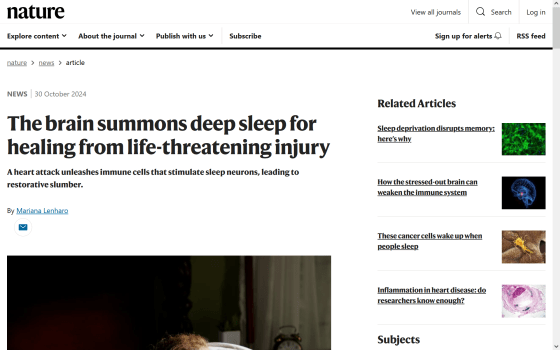It turns out that people become very sleepy after a heart attack, and not sleeping increases the risk of developing cardiovascular disease

It turns out that a heart attack can trigger immune cells to reach the brain and promote sleep, and in mice, those whose sleep was disrupted after a heart attack were more likely to develop inflammation.
Myocardial infarction augments sleep to limit cardiac inflammation and damage | Nature
The brain summons deep sleep for healing from life-threatening injury
https://www.nature.com/articles/d41586-024-03491-2

The effect of sleep on heart health has long been known, with research showing that

Researchers at the Icahn School of Medicine in the United States investigated how cardiovascular disease affects the body by subjecting mice to heart attacks and measuring their brain waves.
The results showed that mice that had suffered heart attacks spent more time in slow-wave sleep, a deep stage of sleep that has the ability to heal, than mice that hadn't suffered a heart attack.
Upon closer inspection, the researchers found that immune cells called
To see if monocytes were involved in sleep, the researchers blocked the accumulation of monocytes in the brains of mice. These mice did not experience an increase in slow-wave sleep after a heart attack, leading the researchers to conclude that TNF acts as a messenger to induce sleep.
What's more, when researchers repeatedly disrupted the slow-wave sleep of mice that had suffered a heart attack, they found that these mice had inflammation in both their brains and hearts and had a much worse prognosis than mice that were allowed to sleep undisturbed after their heart attack.

Following their work with mice, the researchers looked at people who had experienced acute coronary syndrome and found that those who reported poor sleep in the weeks following their event had a higher risk of suffering a heart attack or other serious cardiovascular disease over the next two years than those who slept well.
Based on these results, the researchers pointed out that 'getting enough sleep and rest after a heart attack is important for long-term cardiac healing. Clinicians who treat patients who have had a heart attack should educate their patients about the importance of good quality sleep.'
Related Posts:
in Science, Posted by log1p_kr







